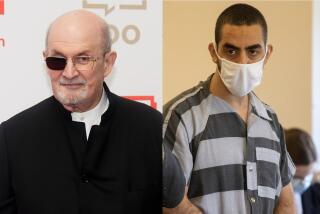Hard-line media groups in Iran increase the bounty for killing Salman Rushdie

Author Salman Rushdie at the London Hotel in West Hollywood in 2012.
Reporting from Tehran â The fatwa issued 27 years ago by Iranâs former supreme leader calling for Salman Rushdie to be killed seems like a relic of a bygone era.
But not to a group of hard-line Iranian media organizations that announced it has raised $600,000 to add to a bounty for the death of the British novelist for writing âThe Satanic Verses.â
The announcement published this week by the Fars news agency, which has close ties to Iranâs Revolutionary Guard Corps, is a sign of political infighting in the run-up to Fridayâs elections for parliament and the Assembly of Experts, the body that will choose the next supreme leader.
Opponents of President Hassan Rouhaniâs efforts to improve relations with the United States and its allies have been taking every opportunity to show there will be no opening to the West, even after a milestone nuclear deal negotiated last year, analysts said.
Farshad Ghorbanpour, a political analyst close to the reformists, said Iranâs young, educated city dwellers have largely forgotten the fatwa issued by Ayatollah Ruhollah Khomeini months before he died in 1989. But he said religious hard-liners âwill bring back a mammoth from the ice ageâ if it serves their political purposes.
The announcement of the new bounty, which came at a digital media exhibition last week, was timed to coincide with the anniversary of the fatwa, according to Fars. The agency said it was one of 43 contributing organizations.
Their pledges theoretically raise the reward money available to anyone who carries out Khomeiniâs edict to nearly $4 million. A religious organization called the 15 Khordad Foundation had offered $3.3 million.
Rushdieâs 1988 novel suggested that parts of the Koran were not the words of God, which Khomeini deemed blasphemous against Islam.
His fatwa prompted Britain to sever diplomatic relations with the Islamic Republic for nearly a decade.
Rushdie spent several years in hiding and has lived under police protection ever since. Several other people involved in the bookâs publication have been attacked, including the Japanese translator Hitoshi Igarashi, who was stabbed to death in 1991.
In 1998, Iranâs then-president, Mohammad Khatami, a reformist, said the fatwa was âfinished,â but the countryâs religious authorities never lifted the edict. Last year, the country pulled out of a book fair in Frankfurt, Germany, when it was announced that Rushdie would be a speaker.
âImam Khomeiniâs fatwa is a religious decree, and it will never lose its power or fade out,â Iranâs Deputy Culture Minister Seyed Abbas Salehi said at the time, according to Fars.
Special correspondent Mostaghim reported from Tehran and Times staff writer Zavis from Los Angeles.
For more international news, follow @alexzavis on Twitter.
More to Read
Sign up for Essential California
The most important California stories and recommendations in your inbox every morning.
You may occasionally receive promotional content from the Los Angeles Times.











